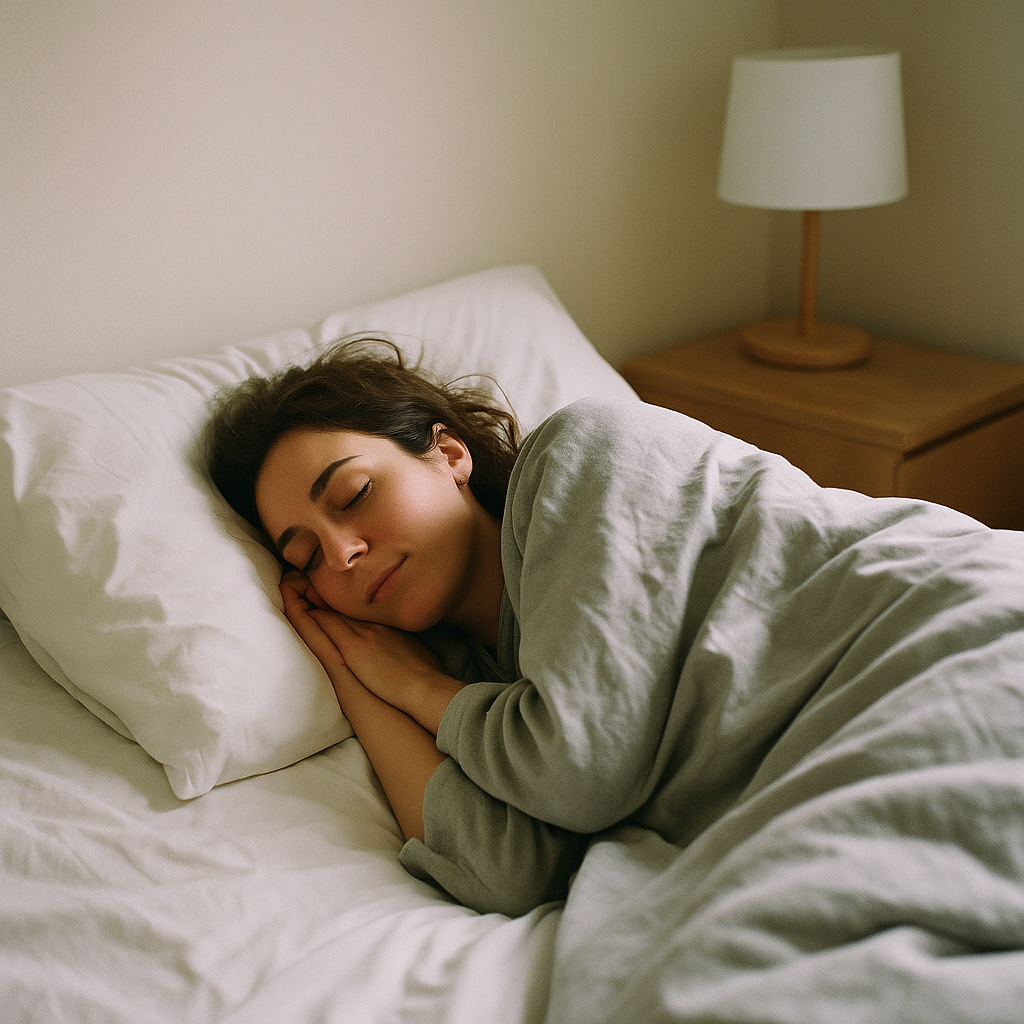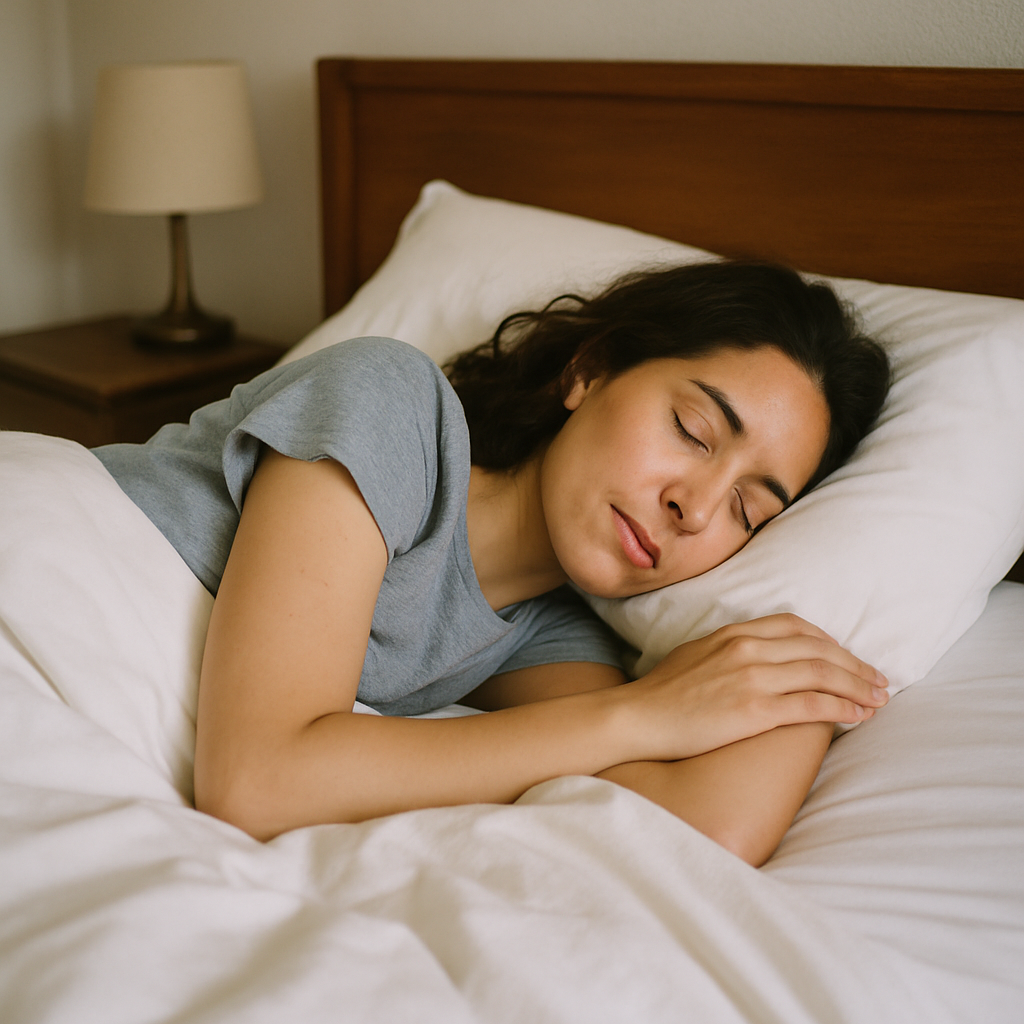Ask Ayurvedic doctor a question and get a consultation online on the problem of your concern in a free or paid mode. More than 2,000 experienced doctors work and wait for your questions on our site and help users to solve their health problems every day.
How to Sleep Better: Ayurvedic Rituals, Remedies, and Lifestyle Tips

If you often toss and turn at night, frustrated about how to sleep better, you're not alone. Millions of people today are looking for ways to sleep better and wake up truly refreshed. Better sleep is not just about clocking in the hours, it is actually about achieving deep, restorative rest that supports your mental clarity, emotional balance, and physical vitality. Thankfully, the ancient science of Ayurveda offers time-tested practices and remedies that help promote relaxation so that you can get better sleep naturally.
In this article today, we will talk about some Ayurvedic insights and practical lifestyle habits that encourage more restful nights. Whether you're struggling with insomnia, light sleeping, or chronic fatigue, these tips for better sleep are rooted in holistic healing — blending mind, body, and spirit. From bedtime routines and herbal teas to magnesium for better sleep and soothing soundscapes, let’s uncover how to sleep better in a natural, sustainable way.
Why We Struggle with Sleep and How Ayurveda Explains It
Sleep issues are not just about being tired. According to Ayurveda, sleep (nidra) is one of the three pillars of health, along with diet (ahara) and balanced living (brahmacharya). When these pillars are out of alignment, your body's natural rhythms gets disrupted. This can further cause poor digestion, restless sleep, and emotional imbalances.
Modern lifestyle factors such as excessive screen time, eating late meals, and high stress levels can often aggravate the Vata dosha, which is the energy principle responsible for movement and the nervous system. When Vata is elevated, the mind races, anxiety spikes, and sleep becomes fragmented or elusive.
Kapha-type insomnia (oversleeping or grogginess) and Pitta-type insomnia (trouble falling asleep due to overthinking or heat) are also common. Ayurveda encourages to understand your unique constitution (prakriti) so that an individual can create personalized routines that restore balance and promote better sleep.

Don't wait or self medicate. Start chat with Doctor NOW
Natural Ways to Sleep Better and Calm the Mind
Ayurveda does not just focuses on treating symptom, it addresses root causes as well. Some of the great natural ways to sleep better are by calming your nervous system, regulating your breath, and preparing your body for rest.
Tips for Better Sleep Using Routine and Breathwork
In order to have a consistent and restorative sleep, you need to create a rhythm for your body. One of the most effective Ayurvedic tips for better sleep is Dinacharya, or daily routine. Going to bed and waking up at the same time eevry day trains your circadian clock, which can further improve sleep quality over time.
You can also add calming breathwork practices like nadi shodhana (alternate nostril breathing) and Bhramari pranayama (humming bee breath) 10–15 minutes before going to bed as it can reduce anxiety and slow down your mind.
You should also try to avoid stimulating activities, especially digital ones, at least an hour before bed. Instead of this, consider choosing journaling, reading, or listening to better sleep sounds like ocean waves, soft rain, or binaural beats that are designed to induce deep delta brainwaves.
Magnesium for Better Sleep and Muscle Relaxation
Magnesium plays a crucial role in over 300 biochemical reactions in the body — many of which directly influence sleep quality. If you’re looking for simple ways to get better sleep, then may be you should try taking magnesium supplements or natural form of magnesium.
Low magnesium levels can contribute to muscle tension, irritability, and nighttime wakefulness. Taking magnesium for better sleep, whether as a supplement or transdermal oil, helps relax muscles, calm the nervous system, and support melatonin production.
Look for magnesium glycinate or citrate for high bioavailability. You can also try taking Epsom salt bath or a warm foot soak before bed as it will help promote better sleep.
Better Sleep Sounds, Pillows, and Bedroom Practices
Creating a restful sleep environment is a hgreat part of Ayurvedic wisdom. Your bedroom should be a sanctuary — cool, dark, quiet, and clutter-free. The ambiance you sleep in can make or break your rest, so make sure to invest in supportive elements.
Better sleep sounds, such as white noise, ambient nature recordings, or low-frequency music, can help drown out distractions and lull your brain into a more relaxed state. Ayurveda recommends soft, grounding tones that resonate with the earth element to pacify Vata dosha and settle the mind.
Another simple yet often overlooked tip is upgrading your sleep better pillow. An Ayurvedic approach favors comfort that supports the neck and aligns the spine. Consider choosing natural materials like organic cotton, kapok, or latex as they are breathable and hypoallergenic, promoting deeper, undisturbed sleep.
Bedroom practices also matter a lot. Dim the lights two hours before sleep, avoid screens (they aggravate Pitta through overstimulation), and consider diffusing calming essential oils like vetiver, lavender, or sandalwood. All of these habits signal your nervous system that it’s time to wind down.

Ayurvedic Sleep Remedies and Nighttime Self-Care
Ayurveda’s greatest strength lies in its daily rituals — small, consistent habits that train your body and mind to expect rest at a specific time. These bedtime routines combine sensory therapy, nourishment, and relaxation to guide you toward better sleep naturally.
Herbal Teas, Oils, and Sleep-Inducing Foods
Drinking warm herbal teas like chamomile, ashwagandha, or nutmeg-laced milk in the evening can help soothe your doshas. Nutmeg, in particular, is a classic Ayurvedic remedy for insomnia due to its sedative properties. You can consider mixing a pinch of nutmeg with warm milk or almond milk 30 minutes before bed.
Sesame oil massage (abhyanga) is another powerful Ayurvedic tool. Rubbing warm oil into the feet, scalp, or full body relaxes the nervous system and supports better sleep. Sesame oil is grounding and warming — ideal for calming excess Vata.
As for food, Ayurveda advises eating your last meal by 7 PM and keeping it light. Late-night eating disrupts digestion, keeping your energy in the gut instead of allowing it to rest. Sleep-inducing foods include cooked oats, ghee, almonds, and stewed fruits, which nourish without taxing the digestive system.
Daily Wind-Down Routine for Body and Mind Harmony
Creating a sacred nighttime routine is not just about hygiene. It is actually a form of self-respect and spiritual alignment. Ayurveda teaches that repetition builds rhythm, and rhythm leads to rest.
Your wind-down might include gentle yoga or stretching (such as legs-up-the-wall pose), followed by warm tea, self-massage, gratitude journaling, and meditation. Stick to a consistent time each night to help anchor your body’s internal clock.
Consider avoiding stimulating or erratic activities after 8 PM. This includes heavy workouts, caffeine, intense conversations, or watching thrillers. The goal is to move inward, into stillness, reflection, and softness — paving the way for rejuvenation and better sleep.
How to Sleep Better Long-Term Through Dinacharya
Dinacharya, or the Ayurvedic daily routine, focuses on balance through predictability. When you wake up, eat, work, and sleep everyday at the same time, your biological systems starts operating with less friction.
Therefore, consider aligning your schedule with natural circadian rhythms: wake by 6 AM (Kapha time), eat the largest meal at noon (Pitta time), and go to bed before 10 PM (when Vata rises again). Living in harmony with nature's cycles is one of the most powerful ways to sleep better and feel grounded throughout your day.
Conclusion
In a world which is full of noise, stress, and overstimulation, quality sleep has become a luxury that many of us are desperate to get. But instead of turning to quick fixes, Ayurveda teaches us that the path to better sleep is a return to balance, in body, mind, and spirit.
From magnesium supplements and better sleep sounds to warm teas and grounding routines, there are many natural ways to get better sleep that don’t require medication. By understanding your doshic makeup, practicing soothing bedtime rituals, and aligning with your circadian rhythm, you can sleep better and at the same time, you can also set the foundation for long-term wellness.
Understand that consistency is key. Even a few simple changes like investing in a sleep better pillow, practicing evening breathwork, or sipping a calming herbal tea can make a great difference in your rest. Let Ayurveda be your gentle guide toward nights of deep rest and days filled with energy and clarity.
Ready to embrace better sleep naturally? Start small: pick one new habit tonight and see how it changes your morning.
FAQs
Why is my body not letting me sleep?
There could be multiple reasons: stress, poor sleep hygiene, hormonal imbalances, or dietary habits. According to Ayurveda, elevated Vata or Pitta energy can cause restlessness and difficulty falling asleep. Addressing lifestyle factors like screen time, caffeine intake, irregular routines, or a lack of grounding practices can significantly improve your ability to fall and stay asleep. Try incorporating tips for better sleep such as evening breathwork, dim lighting, and magnesium-rich foods to help your body transition into rest mode.
Is it better to sleep one hour or none?
While neither is ideal, sleeping for even one hour is generally better than not sleeping at all. A short nap or light sleep cycle can still offer some cognitive and physical recovery. However, consistently getting poor sleep can severely impact your health. Focus on building a sustainable evening routine using natural ways to sleep better, such as soothing sounds, warm herbal teas, or evening yoga, to improve sleep quality over time.
Can eating late or skipping dinner affect sleep quality?
Yes. Eating late disrupts digestion and can keep your system active when it should be winding down, which can impair sleep. Skipping dinner, on the other hand, may cause blood sugar drops during the night, leading to wakefulness. Ayurveda recommends eating a light, warm dinner by 7 PM to support restful sleep. Including grounding foods and a small serving of healthy fat (like ghee or nuts) can help stabilize your energy through the night. These are proven ways to sleep better and wake up feeling refreshed.
Suggested Images and Infographics
-
Beginner-friendly bedtime yoga poses (e.g., child’s pose, legs-up-the-wall)
-
Magnesium-rich food chart (e.g., pumpkin seeds, leafy greens, bananas)
-
Wind-down routine infographic with timing and key activities
-
Comparison chart: Traditional vs. Ayurvedic sleep aids
-
Dosha-based sleep imbalances (Vata, Pitta, Kapha chart with symptoms and remedies)

